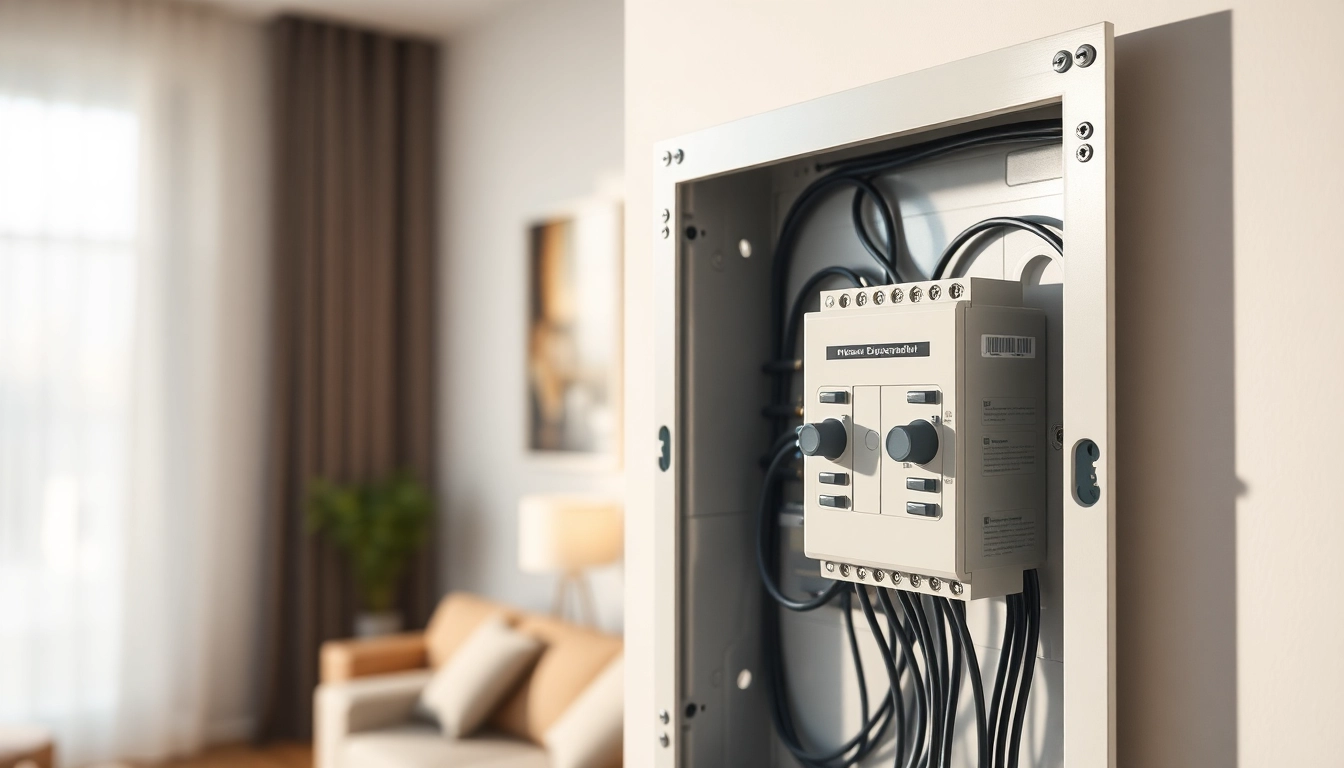What is an Electrical Panel?
Definition and Purpose
An Electrical Panel, often referred to as a circuit breaker panel, is a vital component of a home or building’s electrical system. Its purpose is to distribute electrical power from the utility to the circuits that supply power to various devices around the premises. This centralized hub regulates and protects electrical circuits from overloads and faults, ensuring that your home remains safe and functional.
Components of an Electrical Panel
The essential components of an Electrical Panel include:
- Main Breaker: This is a switch that controls the flow of electricity into the panel and can shut off all power to circuits in an emergency.
- Branch Circuit Breakers: Individual breakers that protect specific circuits. They trip when too much current flows through them, preventing electrical fires.
- Bus Bars: These conductive bars distribute electricity to the breakers. They are typically made of copper or aluminum.
- Neutral Bus Bar: This component connects to the neutral wires of each circuit and is important for balancing electrical loads.
- Ground Bus Bar: Connects the grounding wires, ensuring safety by diverting excess electricity in the event of a malfunction.
- Panel Cover: The protective cover that helps prevent accidental contact with live wires and maintains the overall safety of the installation.
Types of Electrical Panels
Electrical panels come in various types, tailored to the needs and setups of different properties:
- Standard Panels: The most common type, used in residential settings, often ranging from 100 to 200 amps.
- Subpanels: Additional panels connected to the main panel, often used in larger homes or in specific areas like garages and workshops.
- Smart Panels: These modern panels integrate technology, allowing homeowners to monitor power usage and have greater control over their energy consumption.
- Transfer Switch Panels: Used for connecting a generator to the home’s electrical system for backup power during outages.
Signs You Need to Upgrade Your Electrical Panel
Increased Power Demands
As appliances and technology have evolved, they often require more power. If your home has seen an increase in power demands—such as additional computers, HVAC systems, or electric vehicles—it may indicate a need for a larger capacity Electrical Panel. Homes built decades ago often had panels rated for much lower amperages than what modern appliances require.
Frequent Circuit Breaker Trips
If you’re constantly experiencing tripped breakers, this is a strong sign that your Electrical Panel cannot handle the load. Breakers are designed to prevent overload by shutting off power when a circuit is overloaded. Frequent trips may indicate a need for more circuits or an upgraded panel to handle larger loads effectively.
Visual Wear and Damage
Inspecting your Electrical Panel for signs of wear can reveal critical information about its condition. Look for discoloration, rust, or burnt marks around breakers or wires. Any visible damage indicates that your panel is at risk of failure and should be evaluated by an electrical professional.
Benefits of Upgrading Your Electrical Panel
Enhanced Safety Features
Upgrading your Electrical Panel introduces enhanced safety features that protect against electrical fires and shock hazards. Modern panels come equipped with better circuit breakers and safety mechanisms to ensure the safe distribution of electricity. This upgrade can significantly reduce the risk of electrical issues in the home.
Improved Energy Efficiency
Newer electrical panels can improve overall energy efficiency by providing better management of electrical loads. This means that homes can better accommodate energy-efficient devices and systems, potentially resulting in lower energy bills for homeowners.
Increased Property Value
Investing in a new Electrical Panel can increase your home’s value, making it more appealing to potential buyers. An updated panel indicates modern electrical safety and compliance with current electrical codes, which can be a selling point if you decide to market your home in the future.
Choosing the Right Electrical Panel for Your Home
Understanding Electrical Needs
Before upgrading, it’s essential to assess your home’s electrical needs. Take inventory of major appliances and devices. This evaluation will help determine the necessary amperage and features required in your new Electrical Panel. Consider future needs as well—for example, if you’re planning to install an electric vehicle charger, ensure the panel can handle that additional load.
Consulting with Professionals
While DIY assessments can provide insights into when to upgrade your Electrical Panel, consulting with a licensed electrician is crucial. Professionals can conduct load calculations and check local codes to ensure your panel meets licensing requirements. They can also recommend the best products tailored to your unique situation.
Budgeting for Your Upgrade
An upgrade can involve various costs, including the price of the panel itself, installation labor, and any additional upgrades to your home’s wiring or structure. Start budgeting by researching the cost of new panels that meet your requirements and factor in potential installation fees. Investing in quality and safety can save you on repairs and replacements in the long run, making your home safer and more efficient.
Conclusion: Ensuring Your Home’s Electrical Safety
Regular Maintenance of Electrical Panels
To prolong the life of your Electrical Panel, regular maintenance is key. This includes periodic inspections by a qualified electrician who can identify issues like loose connections, signs of wear, or obsolete components. Keeping your panel well-maintained helps prevent problems before they arise, ensuring safety and reliability.
When to Seek Professional Help
Know when to call a professional. If you experience frequent electrical issues, or if you have concerns about the age or condition of your panel, it’s better to err on the side of caution and consult an electrician. Attempting to manage electrical issues independently can pose significant risk.
Staying Informed About Electrical Updates
Staying educated about advances in electrical systems and technology can help you make informed decisions regarding your Electrical Panel. Innovations in energy efficiency and safety are constantly evolving, presenting opportunities for improving your home’s electrical system. Take the time to learn about options and improvements that suit your home, and work closely with professionals to ensure safety and compliance with standards.



